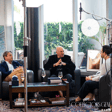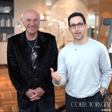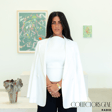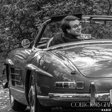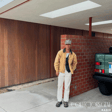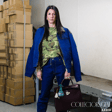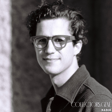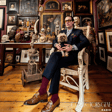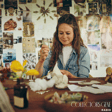The Art of Collecting: Time, Money, and Depth
00:00:00
Speaker
All the money in the world can't make a great collection, but time and money can. Because if you want to buy everything within a couple years, your collection is going to look like it.
Exploring the 'Collector's Gene'
00:00:13
Speaker
What's going on, everybody? And welcome to Collector's Gene Radio. This is all about diving into the nuances of collecting and ultimately finding out whether or not our guests have what we like to call the collector's gene.
00:00:26
Speaker
If you have the time, please subscribe and leave a review. It truly helps. Thanks a bunch for listening, and please enjoy today's guest on Collector's Gene Radio.
Introducing Justin Gruenberg: A Legacy in Watches
00:00:38
Speaker
Sometimes you can look at a collector and just know that they have the gene. And that couldn't be more true than with today's guest, Justin Gruenberg. The last name rings through Beverly Hills as his family's been in the business for years. And Justin's no exception as his two brands, the Keystone and Lupus, happened to be some of the most influential in the watch industry. As co-founder of both, Justin's collecting philosophies render right through the ethos behind both platforms.
Balancing Rarity and Personal Taste
00:01:03
Speaker
Aside from Rarity, he's a what meets the eye type of collector and it doesn't stop at watches. Having grown up going to museums, it was inevitable that his interest wouldn't align with art and design, of course, in true collector's fashion. He's a tastemaker with a pulse on what's next for him, not everyone else. So without further ado, this is Justin Groomberg for Collector's Dream Radio. Justin Groomberg, welcome to Collector's Dream Radio.
00:01:30
Speaker
Yeah, thank you very much. I'm excited. I'm excited for this. Yeah, me too. I appreciate you coming on. So most people here will know you for your companies, the Keystone and LoopThis, both of which we will get into in just a bit. But let's take a step back and learn a bit more about how these companies came to be, which kind of starts with your parents, right?
00:01:54
Speaker
Those two companies, not so much, but I would say that my career started technically with my father being in the jewelry business. And then those companies kind of came a bit later in time from when I started in 2008.
00:02:11
Speaker
Yeah, definitely. And I guess I meant more so to say that your passion for all this stuff kind of came from your parents and how you really learned about all that, right? Like your dad kind of grew up in the era of being able to go to flea markets to find things. And he had a storefront in Beverly Hills for a long time. Yeah, totally.
Learning from Family: Embracing Risk and Uniqueness
00:02:30
Speaker
If you talk to, I mean, obviously as you've probably discovered that when you talk to people that have kind of made this their life, it started at an age that they can't even remember. You know, like I can't even tell you when the first flea market or museum or whatever it might've been where kind of these interests evolve or come to fruition. I don't even, I couldn't even tell you what that point was. You know, I have a three year old now and I'm thinking like,
00:03:00
Speaker
Now I know how it all makes sense, like if your parents are in that mind state. Yeah, for sure. Did your dad teach you a lot of the stuff that you know now or at least give you that kickstart?
00:03:14
Speaker
Yeah, I mean, I think that what he taught me was to basically kind of embrace risk and to kind of go with, you know, what your taste is. Did he teach me market price and all that type of stuff? No, but like, I mean, I probably knew words like, you know, protect Philippe and Cartier, probably in the same era that I knew banana.
00:03:41
Speaker
I think my uncle's dog was named Cartier, you know, when I was like, like, you know, a toddler. So these things were like part of, you know, like to start dialect. Amazing. And your mom was bringing you to museums at a young age. She was a painter. What did that teach you in terms of who you are as a collector, first and foremost, and second, as someone who has to source and hunt things for your companies, the Keystone and Lupus?
00:04:09
Speaker
Yeah, I mean, being that my mom's an artist, you know, I think when you're in kind of this watch collecting mentality, it can be somewhat limited based on kind of historical trends and kind of you're always referencing what other collectors had or what was popular in the 90s or whatever. But I think when you're thinking in terms of art, you're always thinking,
00:04:35
Speaker
of what's different, what's new, what haven't we seen before. And of course there's all these like representational things and signifiers that point to other movements, but you're kind of always embracing different things. And I think that she's kind of instilled that side of it.
00:04:54
Speaker
in me to kind of embrace what's different, don't look at what other people are doing and kind of follow something that's potentially what's inside of you and go with that, whether it's popular or not. Were you always a collector of sorts as a kid?
From Childhood Passion to Serious Collector
00:05:12
Speaker
Yeah. I mean, I'm kind of like of the belief that, you know, everyone is a collector, right? Like, I mean, you kind of, when, when you're like a kid, you, I think I had like McDonald's toys or, you know, think something like that. And you and I both took inventory every night, uh, to make sure that nothing was missing. Um, those things are probably like pretty, uh, normal for just people in general.
00:05:39
Speaker
When did I make a conscious decision that this was going to be something that I had a vision for having a bunch of objects as a whole and how they relate to each other? I don't know when that happened. Probably after my work career started. You have all this knowledge and interest now. I'm curious to know if that was the impetus to start Gruenberg Watches, which eventually turned into the Keystone.
Innovations in Auction Models: LoopThis
00:06:08
Speaker
Yeah, so there's still, you know, I still have, you know, like the Gruenberg side of our business. Keystone, we do, you know, like with Max, who's a partner in the Keystone, we kind of handle our online presence and we have a store, like a showroom in West Hollywood. And then on like the Gruenberg side, we still have like our family business where we operate kind of,
00:06:35
Speaker
watches and jewelry, my father's still working. So I think that these are like, it's kind of like a conflated, you know, situation, but they all kind of operate in congruence. And Lupe, this kind of seems like a culmination of all your work and collecting in the industry, would you say?
00:06:53
Speaker
Yeah. I mean, when you're kind of doing this on a day-to-day basis, if you're someone like me who kind of just doesn't ever put these things to rest, you're kind of always thinking about how things can work better, how I can improve the way I do things, time management, all these things. And Eric and I
00:07:17
Speaker
partaken in the auction world on several different levels as buyers and sellers. We just thought that there was room for another model that should be explored. So we created Loop This, which has been, for us, been going great. And I think that it's really exciting for us to see what comes in and also to see
00:07:39
Speaker
you know, all these young new collectors that are kind of embracing a model that's, you know, much faster and cheaper than, you know, the kind of traditional models. Yeah. And, you know, you're and Eric's name have been around in the industry for a long time. People trust you. And I think that there's a lot behind that where two guys can come in and kind of take the auction world by storm when you have these massive companies still running auction houses and people don't trust them.
00:08:09
Speaker
Yeah, I think that it's one of those things that there will always be both. People are like, oh, are you guys going to take out Sotheby's? And we're like, no, this is like, we look at it as a completely parallel type of model where both are kind of, I don't look at one as kind of replacing the other. I just look at the appetite for watches as being all year round, all times of the day.
00:08:39
Speaker
And people want to be able to see what's new constantly. When we're working with collectors, they want to know what came in today, not what came in last week or six months ago. So I think that this kind of satisfies that appetite for new stuff 24-7.
00:09:01
Speaker
Yeah, I mean, there's definitely similarities between the two platforms that you have, right?
Ensuring Buyer Confidence with Detailed Descriptions
00:09:05
Speaker
Both are for prospective buyers and collectors, and the Keystone really has that niche of high-end and rarity and highly collectible stuff. And, Luke, this is an auction-based platform that focuses on kind of a nice mix of all those price points, right? You could go on there. There was a Hermes H08 O'Dinky that just sold a couple days ago, and then you could go on there and buy rare Royal Oaks.
00:09:30
Speaker
Yeah, totally. And it's used for other people to be able to sell their watches, and we're the facilitator of that. So I think with Keystone, it's our inventory. So we kind of select...
00:09:46
Speaker
what we want to put that out there and how we want it to reflect, you know, what we do loop. This is, is more just putting two parties kind of together at a rate that we think is fair and try to get something done at fair market price in a quick way. Yeah. I mean, I look at you guys as the bring a trailer for the watch market. Yeah. Yeah. You know, like there's, there's,
00:10:14
Speaker
There's no unopened doors when it comes to that. You guys give great descriptions, great photos that really depict the condition of the watch. And I feel like if anyone has questions, you guys are pretty available to answer them. And that's hard to do. That's really difficult to do, especially with the big auction houses where it's a lot more difficult to get that done.
00:10:36
Speaker
Yeah, for sure. I mean, I know from just buying from, you know, the bigger auction houses, just sometimes you're waiting for conditioner reports and you get it, you know, five minutes before the sale begins or it's hard to make kind of
00:10:53
Speaker
you know, educated decisions based on, you know, a lot of the information that you're given at times. So we try to put it all out there. And if we miss something, then we're there to, you know, kind of assist that. I mean, we are not immune to making mistakes or, you know,
00:11:13
Speaker
being slow to respond, we try our best to make all those things as efficient as possible. Obviously, Eric and I are like 100% involved in every aspect of the operation. So we want to make sure that we're there for people to reach.
00:11:35
Speaker
Yeah, I mean, look, nobody's perfect, right? And no platform or service is ever perfect, but you guys are doing a darn good job and I'm excited to see what evolves from it. Appreciate that. So collecting is a pretty personal pursuit of passion and I'm curious to know what you think or how you think both of your platforms kind of cater to the emotional and psychological aspect of collecting,
The Emotional Dynamics of Auctions
00:11:58
Speaker
right? Especially from an auction standpoint, what makes someone else be so excited about a watch and
00:12:04
Speaker
Maybe click the bid button a little bit higher than they were expecting to when they came into the auction. Yeah, I mean, I think that they're all types of collectors, right?
00:12:15
Speaker
They're collectors that wake up one morning and decide that they were never thinking about that watch and decide to make the extra run to enter it in their collection or start it or whatever it might be. And then there are others that might have something on their checklist and are waiting for it to come up for a long time and happen to see it on our platform and make the effort to get it.
00:12:43
Speaker
I kind of find that when I'm buying from my collection, I'm looking everywhere. I'm looking in every aspect possible with other dealers, with collectors, with auctions, et cetera. So I think that when you're thinking of
00:13:00
Speaker
you know starting a collection or building your collection you kind of just have to look at every outlet there is possible and kind of make sure that those relationships are there for when you know when something comes up you're prepared to buy it.
00:13:16
Speaker
Based on the idea of balancing the preservation of traditional collecting practices and adapting to technology, was that a difficult kind of aspect of making LoopThis a successful platform to create the old school collector meets technology and you kind of have to mesh those two together?
00:13:40
Speaker
Yeah, I think that watches themselves, I find to be a little bit of a different type of collection than say like art or design. I think that when you think about how watches are collected, it's kind of like, you know,
00:13:58
Speaker
kind of accumulate things over a certain period of time. Typically, the best collections are accumulated over a very long period of time, even despite how much money that goes into them. So I think that this is like dealing with the technological part of it.
00:14:17
Speaker
is a little bit different because watches in themselves are kind of like purchased on a piece by piece thing and then they're kind of like accumulated. Where like in art, I feel like you're kind of creating this ensemble or like with design, you're creating this like ensemble of how everything looks together. Like when you enter a room or something, you can tell like how much time has been put into that collection based on like a feeling. I think with watches,
00:14:47
Speaker
It's a little bit, you don't see often all of a collection together to kind of get a sense of what time was put into it. You know, like I think that...
00:14:57
Speaker
When you look at someone like Auro, who's like this kind of John Goldberger, who's this like iconic collector of watches, you can kind of see, okay, like there's this huge, huge amount of time that went into that. Not only the amount of academic research, but also just 40, 50 years of doing this. And I think that it's very rare in watches that you get to see everything together to kind of understand that.
00:15:24
Speaker
Yeah, I couldn't agree more. I mean, he's definitely one of the ultimates, that's for sure. Yeah, and he has the experience. I always tell people that are starting their collections and obviously have a lot of money or they have the bug to put everything together. It's like all the money in the world can't make
00:15:48
Speaker
a great collection, but time and money can. Because if you want to buy everything within a couple years, your collection is going to look like it. So I think that that's a huge part of it.
A Journey with Vintage Cartier
00:16:02
Speaker
All right, let's talk about your personal collecting for a minute. As the community knows, you are very much a part of the Vintage Cartier crew, understandably. Was it always Vintage Cartier, or has that evolved kind of over time? No, I mean, I think that
00:16:18
Speaker
Probably in the way beginning, I was interested in sport Rolex. This is like 2007, 2008 for kind of the big recession of that time. Cartier was something I admired. My parents had Cartier's from, you know, just
00:16:40
Speaker
things that they had kept in jewelry over the years and also there is a certain point that my father post 9-11 was able to buy like a massive collection in the Middle East of like kind of brand new old stock 90s Cartier. So I kind of grew up with those in my knowledge and in my you know like that I've seen them before but they weren't something that I like initially like decided that that was going to be what I was going to collect.
00:17:09
Speaker
I think over the last 10 years, plus or minus, I've just gained this increasing love for Cartier, the history, the fascination with the people who wore them, Hollywood, all these old things where they had big mark on.
00:17:32
Speaker
So I kind of like, this is just like an increasing interest that it hasn't really died at any point since the point where I was like, okay, this is going to be a focus. You have a big focus now on, or at least for the last X amount of years on Cartier London, but also some other special kind of art deco pieces. I'm curious to know what attracts you most to those. I mean, when you look at Cartier and you,
00:18:00
Speaker
When you see a lot of stuff, when you're handling hundreds, if not thousands of watches a year, you get a sense of what's out there. Cartier in general, but I would say pre-1990, you get a sense of just the rarity of certain models.
00:18:21
Speaker
You know there were things that i didn't buy over the years that i regret it there are things that i had and sold that i wasn't able to ever buy back again so i kind of got a sense of just what's out there when you when you see like a nineties auction catalog.
00:18:37
Speaker
or you look in the George Gordon book of Cartier, and then you see those watches reappear and there hasn't been another example of that watch since that point, then you really get a sense of just the scope of what was made and just what's out there. Is there a favorite design, or case shape rather, of Cartier that you love?
00:19:03
Speaker
You know, I'd say probably the Normale and the Tank Louis are probably, if I had to scale down, I know most people would maybe choose the Tencentre. I love the square shapes, personally, but none of them, I would really... If I had to choose one, I don't know what I would do. Yeah, that's always tough, right?
00:19:32
Speaker
So some of my favorites are like the hexagonal, the elongated hexagon style ones. I think one just sold in London from an auction house not too long ago and some of that stuff's just wild.
00:19:48
Speaker
Yeah, you know, I do have a lot of kind of the more avant-garde shapes that kind of signify the kind of swinging London era of design. And I think that those watches as objects are incredible. Even the crash
00:20:08
Speaker
I have several of them that I've kind of put away over the years and I'm fast every single time I take one out. It has like a certain feeling that no other watch that I've come across kind of has. But in terms of wearing them, I've never been able to wear kind of these eccentric shapes as much as like a Cartier classic.
00:20:33
Speaker
Yeah, for sure. I mean, there's a time and place for them and I think there's certain events where it makes sense, but rocking one on an everyday basis is definitely not probably where most people's minds go to. Yeah, definitely not. I'm somebody that wears a watch for two, three days and then puts it down for a bit and then wears something else and then I'll go back to it a year or two later.
00:20:56
Speaker
I don't really have anything that I'll wear for several months straight just based on like I think a personality thing where I constantly need to be changing, you know what I'm doing.
00:21:08
Speaker
Yeah, I'm the same way. Sometimes I'll even admittedly wear a couple watches throughout the day, but that's neither here nor there. How about some other brands you're into?
Art Deco Fascination: Patek Philippe and Audemars Piguet
00:21:20
Speaker
Patek Philippe had a lot of these Art Deco, less avant-garde, but still avant-garde designs. Vintage Audemars Piguet made some really interesting dress watches back in the day. Is that stuff that interests you?
00:21:33
Speaker
Yeah, I mean, Patek and AP, you know, I've collected both of them, especially I love that, you know, like the 20s, 30s kind of
00:21:44
Speaker
early repeaters and perpetuals and complete, you know, full calendars and these type of things in both brands are incredible watches and kind of point to this kind of industrialist period in the US and Europe. And you kind of find when you start researching the stories of who owned them, it's fascinating, like, you know, these, you know, the Henry Graves types.
00:22:13
Speaker
particularly and have been for a while, although I can't really have the joy of wearing them, of like these wild Piaget's from the 60s and 70s, which I've kind of been into like these big cuff watches and kind of bangle styles that in the last year or two have been extremely popular and harder to find. But I love that period of Piaget
00:22:42
Speaker
I would say that the brand is important to me, but in general, it's the style and the feeling more than anything.
Deciding Between Keeping or Selling
00:22:53
Speaker
Yeah. Is there ever a struggle of keeping something for yourself versus putting it up for sale to the public, or are you pretty jaded by most stuff now that there's really no conflict of interest because you're after what you're after?
00:23:06
Speaker
I think it's kind of both. I think that a lot of people would say that I'm a bit jaded because I've seen a lot of stuff and how could you possibly sell this watch? It's so incredible. But I do put a lot of stuff aside that I want to keep and I kind of go back and forth. Sometimes I'll take something out that I've had aside or I've collected for a long time and decide to sell it.
00:23:36
Speaker
Recently, we just put up a London crash from 1990. I saw that. Yeah, that I had for a bit and just decided to part with it. I have a Platinum one that I've kept. So I've just kind of, this kind of goes in and out of, you know,
00:23:54
Speaker
I kind of weigh whether I'll be able to find one again or whether I'll want to purchase one again. So I kind of like go in and out of what I decide to sell and what I decide to buy and keep. But obviously like 99.9% of stuff as a dealer, because they say what, don't get high on your own supply, right? Yeah, easier said than done.
00:24:18
Speaker
You posted a picture, uh, some time ago of a AP minute repeating dress watch kind of in a tortu midi style case. That watch is fascinating. What's the history on that? Um, yeah, the, I bought that watch at Anna quorum.
00:24:36
Speaker
maybe during the beginning of COVID, the estimate was quite low. And I had some idea that I was going to buy it relatively cheap. And I think I was bidding against another dealer that was kind of pushing the price up. And that's a watch that I think is like an incredible kind of John Shafer case, right?
00:25:01
Speaker
Yeah, and it kind of has this interesting lever for the minute repeater. It almost looks like a revolver. Yeah, totally. It's kind of an extravagant kind of design for the repeater lever. Yeah, so I think it's these watches, you know, I collected the 2524 minute repeater by Patek. This kind of like era and kind of simplicity of
00:25:28
Speaker
Repeater design I find to be like the best period in complicated watch design I was listening to your episode with aro and and just how he was speaking about the one watched was the Schultz That he he regretted not buying and I think that those watches are like truly the best of the kind of their kind, you know Yeah, absolutely
00:25:52
Speaker
Do you prefer more so watches on leather straps versus bracelets or do you like a mix?
00:26:00
Speaker
I like bracelets, for sure. Even when I buy something on a strap, I wear it for quite a while. And then I think I'd love to find a bracelet, even if it's not the exact period, but something that would make it a little bit more casual at times. So I'm definitely more of a bracelet person than strap, but I would say that most of the things that I've collected have been straps over the years.
00:26:27
Speaker
Something you're also passionate about is art and design and that's another area that you collect in their period that interest you most.
00:26:36
Speaker
No, I would say that it's not necessarily period, but I would say that in general, I'm interested in like French design, but, you know, anywhere from like the 20s, you know, to the contemporary stuff. When I'm not looking at watches, I'm practically scouring all the auction houses to, you know, find particular things that I'm fascinated with in terms of design. And mostly I would say recently it's been
00:27:06
Speaker
you know, like this 80s, 90s period of, you know, French design, but not limited. I'm kind of always open to different things.
00:27:16
Speaker
Do you approach collecting in those categories the same way that you do in watches,
Furniture vs. Watches: Originality and Market Knowledge
00:27:21
Speaker
right? A lot of the same things matter, but it's a completely different beast, right? So for me, when it comes to furniture, it's very common for things to be reupholstered or refinished. And a lot of times it really doesn't matter. But comparing the same actions to the watch world, the repercussions are much greater.
00:27:39
Speaker
Yeah, I mean in terms of details based on the knowledge I have, which is pretty limited I would say, I would say that I try to buy super original things. Now the difference would be in terms of price,
00:27:56
Speaker
I'm a complete sucker. Like when it comes to furniture and design, I'm often overpaying for things that I like because I have no intention of selling them. And I don't know, maybe it's a little bit harder for me to distinguish what the market is. So I end up buying things that sometimes hurt.
00:28:17
Speaker
record prices, even on smaller objects. And people have told me, oh my God, why did you pay so much for that? And it's because I like it. And I have the fortune of forgetting what I paid for things that I want to collect.
00:28:32
Speaker
which is like makes it a bit easier when it comes to things that I'm reselling. I could, I could tell you that, you know, what I, what I paid for something 10 years ago. So that's probably a good business, uh, strategy, but not so, not so good when it comes to collecting.
Rapid-Fire Reflections: Philosophy, Regrets, and Influence
00:28:48
Speaker
Love it. Justin, let's wrap it up here with the collector's team rundown.
00:28:52
Speaker
You can answer these questions, as you know, based on any of the items that you collect. You could base it on items that you've sourced for the Keystone or things you've seen go on with loop this or your personal collections. Totally up to you. Yeah. All right. What's the one that got away? There was a watch that was in front of me. I think it was at a New York.
00:29:13
Speaker
IWJG show, which is going to sound kind of weird, but it was a Greama, Andrew Greama watch in yellow gold with like a big blue Topaz crystal. And I was, I saw it handed to somebody and they gave him a price and I was just kind of standing around waiting for them to say no. And they bought it right in front of me. And then I said immediately, I was like, well, how much is it? You know, and they were like,
00:29:38
Speaker
100,000. And I think at the time they just paid 20,000 like two minutes before. And I was like, no way. I'm not doing that. And then I let it go. And then it ended up going to the Omega Museum or something like that. I think it's in the Omega Museum. And that was the watch that I was like, I still think about it. It's probably 10 years ago, but I still think about that. Not because of the price, but because I just love that era of design. And I love Andrew Green and stuff.
00:30:09
Speaker
the on-deck circle, so what's next for you in collecting, maybe something you're after? You know, I'm really focusing on small watches. I have this, like, reinvigorated passion for, like, the Patek 96, bubblebacks, kind of this 40s, 50s era of Rolex, you know, with all these incredible dial designs and case designs. I'm always looking for those watches.
00:30:37
Speaker
You posted a pretty insane bubble back, maybe it was yesterday.
00:30:42
Speaker
Yeah, I'm actually wearing that one right now. I bought this one maybe three years ago. I bought it from a dealer that bought it from another dealer that bought it on eBay. And I think all three of those transactions took place in about a week time. And I think I paid about 400% margin from the eBay price. From the original, yeah. Is it pink gold? It's yellow. Yellow. Yeah, super cool watch.
00:31:12
Speaker
I think the 96, I've said it on this show before, but I'm a huge fan of the 3796, the reissue that they did. I think they're super undervalued. I think anybody looking to get into Patek Philippe collecting or even your first Patek Philippe, a 3796 is a great place to start. I mean, how many other Calatravas can you get in that price range with that kind of history lineage?
00:31:38
Speaker
Totally, and they look even side by side, they look very similar to an original 96. 100%. Yeah, they're great watches. The unobtainable, so maybe one that's too expensive or in a private collection, a museum, just complete unobtainium, but you'd love to have. I would say probably
00:32:01
Speaker
unrelated to watches, I would say a Lalon Rhino bar. I don't know if you know what that is. I do, and I've seen it. It's insane. Yeah, I would say that if there's anything that I was like, you know, the one just brought a world record, I think it brought 18 million, which was like the kind of model for the series of eight. Was that at the auction last year that they did from the estate? Yeah, yeah, I would say that that would be
00:32:31
Speaker
100% unobtainable. But would be amazing to have for sure. Totally. The page one rewrites. So if you could collect anything besides watches and art and design and money was absolutely no object, what would it be?
00:32:46
Speaker
I wouldn't even know where to go with that, because I think that collecting is like a rabbit hole of where you start and where you end up. If I were to start again, I'd probably just end up retracing my steps in some other way, but end up hopefully in the same point, because I think that it's always this process of how you get there. I couldn't just jump into something. I think I kind of explore what I already want to explore.
00:33:14
Speaker
How about the goat? Who do you look up to in the collecting world? I would say that these kind of historical art design collectors like, you know, Yves Saint Laurent and Pierre Bourget, I think like a lot of these amazing collections were kind of collaborative efforts between two partners or like a dealer and a collector. I couldn't name one that I look at and like, those are the goats.
00:33:44
Speaker
That's the goat, but there's several, even now, like Terry de Gunzburg, I think their collections are so magnificent that I always look at their, and kind of try to understand what their thought process is. Yeah, it's always interesting to look at someone like Yves Saint Laurent and see
00:34:08
Speaker
the way that they collect versus the way that they create products or design products and the juxtaposition between the two and how different they could be. Totally. And just like what it's like to live with things. Right. You have like this all these eras of things that are just together you have like you know these extraordinary like kind of uh older works from the 1800s with
00:34:34
Speaker
the lawns and war halls on the wall. I think that trying to think of how everything kind of relates to each other and what it's like to live with and how memory plays like a part in those collections. I'm kind of fascinated by that, those collectors. More than I think anyone in the watch world. Probably, yep. How about the hunt or the ownership? Which one do you like more?
00:35:02
Speaker
Yeah, I mean, no doubt the hunt. I think the ownership is just a byproduct of the hunt. So I think that what you'll find out is, or you've already found out, is that once you have something, oftentimes it's kind of like an ephemeral thing. You're always kind of on to the next thing. It's hard as a collector to just take a point in time and say, okay, this is exactly how I'd want it to be.
00:35:32
Speaker
Couldn't agree more. Most importantly, do you feel that you were born with the collectors, Gene? Yeah, undoubtably. I just saw, we just had Freeze Fair in LA and my son, who's three, I told you, brought his measuring tape to one of the shows and he started
00:35:52
Speaker
took out his cape and I was like, oh my God. I guess people would say it's like there's something like some illness to this, but I guess the great thing about collecting this kind of illness and obsession are acceptable qualities.
00:36:13
Speaker
Exactly. It's one of the only illnesses, I think, in the world that probably makes you feel good. Totally. Love it, Justin. Thanks so much for coming on today on Collector Gene Radio. Everyone needs to go check out the Keystone if you haven't yet, and of course, loop this and just go through the process of maybe bidding on a watch or dealing with the team over at the Keystone. Appreciate it. Thank you, Cameron. Anytime. Take care. Take care.
00:36:39
Speaker
Alright, that does it for this episode. Thank you all for listening to collector's gene radio

